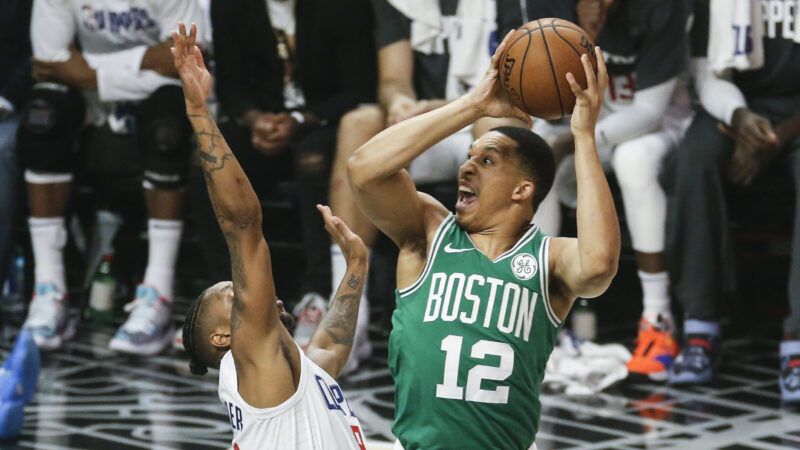Massachusetts' Wealth Tax Encouraged NBA's Grant Williams To Sign With Dallas
Grant Williams breaks down the math: "$54 million in Dallas is really like $58 million in Boston."

By approving a new wealth tax last year, Massachusetts voters might have dented the Boston Celtics' chances of chasing down a National Basketball Association (NBA) championship.
Grant Williams, a talented power forward drafted by the Celtics in the first round just four years ago, declined to re-sign with Boston this summer. Instead, he'll be playing next season in Dallas, where his new contract won't be subject to Massachusetts' so-called "millionaire's tax."
Williams told The Athletic that his decision to sign a $54 million deal with Dallas over a $48 million offer from Boston was "a little strategic" and that the gap between the two offers was larger than it might seem.
"In Boston, it's…$48 million with the millionaire's tax, so $54 million in Dallas is really like $58 million in Boston," Williams said.
In Texas, which has no state income tax, Williams can keep more of his earnings, though it is worth noting that professional athletes unfortunately owe taxes in states where they play road games. His new state's tax situation gives Williams a nice incentive to move, considering Massachusetts would have taken 9 percent of those earnings—thanks to its 5 percent flat income tax and newly created 4 percent tax on income in excess of $1 million.
Voters narrowly approved the millionaire's tax in a referendum last year. As Reason reported at the time, teachers unions there spent large sums on the campaign to create the new tax, which will mean more money for the state to distribute to public schools.
But Williams' decision to leave Boston for Dallas is a perfect illustration of the warnings issued by opponents of the new tax.
A 2021 report from the Beacon Hill Institute, a free market nonprofit, estimated that the millionaire's tax could cost Massachusetts more than 9,000 jobs and reduce the state's overall gross output and real disposable income—a result of wealthier residents shifting assets and investments to other states. A 2022 study by Massachusetts-based Tufts University warned that "some high-income residents may relocate to other states" and that "tax avoidance could be widespread."
That's likely to worsen Massaschusetts' population drain, which was already underway before the new tax was imposed. The state has been losing about 25,000 people per year on average for the past quarter-century, but Census Bureau data shows that trend has accelerated over the past year, according to WWLP, a television station in Springfield, Massachusetts.
A 2018 Cato Institute study found that people tend to migrate to states with relatively lower taxes. And that was before the pandemic-induced increase in remote work. You don't have to be a professional athlete to make the choice Williams made—but it's a choice that might hurt Boston's other teams too: The Boston Globe reported in December that the millionaire's tax was complicating the Red Sox's pitch to prospective free agents too.
"Grant Williams just gave us a concrete example of how our state's new tax code is making it more difficult to compete in Massachusetts," Paul D. Craney, a spokesman for the Massachusetts Fiscal Alliance told the Boston Herald. "There are small business owners and retirees doing the math out and coming to similar conclusions."
For anyone choosing to pull up stakes and move out of state, taxes are only one part of the overall equation. Williams, for example, said he was also attracted to signing with Dallas by the potential for more playing time.
Still, it's undeniable that Massachusetts' decision to hike taxes on the wealthy played a significant role in Williams' decision to take his talents elsewhere. He might be the most high-profile example, but he's surely not the only Bay Stater weighing a similar set of choices.


Show Comments (71)